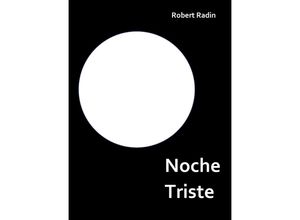In Noche Triste (¿Sad Night¿) Robert Radin explores his struggles with anorexia in the 1980s.
He also examines the history of self-starvation ¿ its roots in rituals of religious
purification its development into an entertainment craze its use as a tool of resistance ¿
and in the process forces us to reconsider what it means to have anorexia. As his starving
becomes an increasingly political act and he ventures to Mexico alone alienated from loved
ones we realize he¿s in the grip of something dangerous that neither he nor we fully
understand. Written in exquisite prose Noche Triste is a devastating revelatory chronicle of
a complex illness. In this unflinching memoir Robert Radin describes a painful struggle with
anorexia that begins with the diagnosis of a friend¿s sister. Interweaving his personal
recollections with historical accounts of fasts holy visions hunger strikes and
force-feeding he turns a lens on the role that hunger has played both in public and in private
not only in the realms of medicine and psychology but in art culture and religion. Ultimately
though this is a strikingly intense and personal story framed within the larger context of an
illness that continues to defy generalizations. ¿Leah Browning author of Orchard City and In
the Chair Museum Robert Radin¿s Noche Triste goes straight to the heart of anorexia and refuses
to look away. It¿s a heartfelt fast-paced often startling study of the disorder¿s paradoxes
and Radin¿s own passage through them. By disappearing you appear he writes and by appearing
you disappear. I found it riveting. ¿Rosecrans Baldwin author of Everything Now ¿Robert
Radin¿s poignant beautiful memoir tells the story of his quiet descent into anorexia with
grace and sensitivity. Noche Triste is every bit as informative as Hilde Bruch¿s classic The
Golden Cage. When Radin reveals the traumatic antecedents of his eating disorder his voice is
clear and brave. ¿Robert Brandt Ph.D. clinical psychologist and co-founder of The FACE
Program

